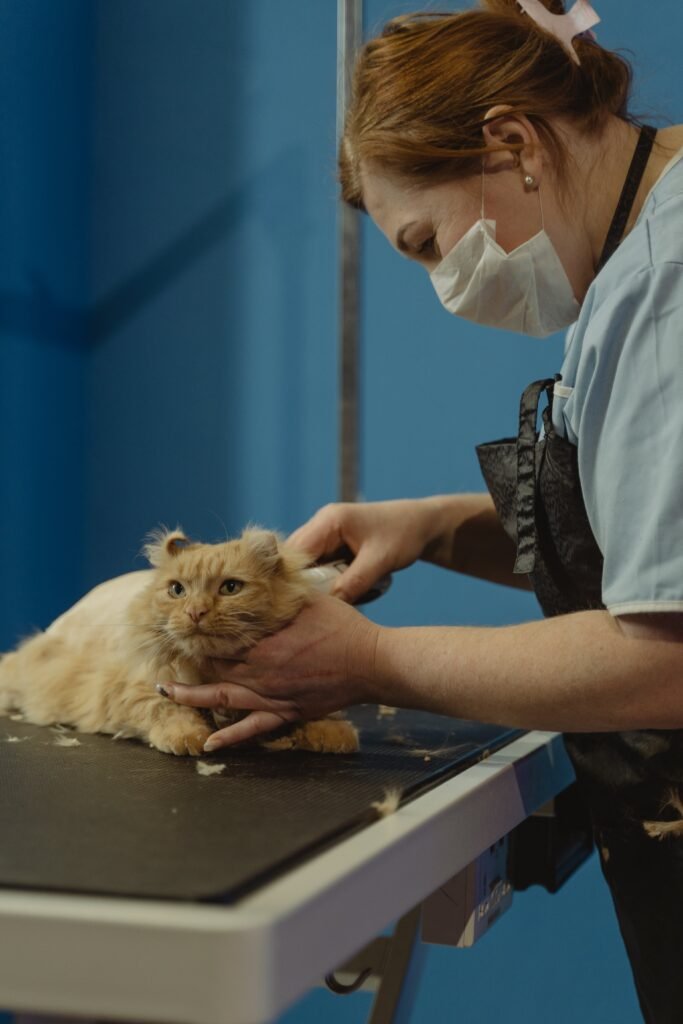Constipation in cats is a common issue that many cat owners may face at some point. When a cat is constipated, it means they have difficulty passing stool or aren’t pooping as regularly as they should. It can be uncomfortable for your cat and sometimes indicate an underlying health problem. In this post, we’ll explore what causes constipation in cats, how to spot it, and what you can do to help.
Causes of Constipation in Cats
Constipation can happen for several reasons, and understanding the causes is the first step in treating and preventing it. Here are some common causes:
- Dehydration: Cats that don’t drink enough water can have hard, dry stools that are difficult to pass.
- Hairballs: Cats that groom themselves frequently may swallow too much hair, which can cause blockages and lead to constipation.
- Lack of Fiber in the Diet: Just like in humans, a low-fiber diet can lead to poor digestion and constipation in cats.
- Obesity or Lack of Exercise: Overweight cats or cats that don’t move around much may experience slower digestion.
- Underlying Health Conditions: Conditions such as kidney disease, diabetes, or digestive issues can contribute to constipation.
- Blockages: In some cases, foreign objects or even tumors can block the intestines and cause constipation.
Signs and Symptoms of Constipation in Cats
It’s important to recognize the signs of constipation in your cat early to prevent it from getting worse. Some common symptoms include:
- Straining in the litter box: Your cat may spend more time in the litter box, trying to poop with little success.
- Small, hard stools: If you notice your cat passing small, dry, or hard stools, it could be a sign of constipation.
- Lethargy: A constipated cat might seem less active or tired.
- Loss of appetite: Cats with digestive discomfort may eat less or refuse food.
- Vomiting: In some cases, constipation can cause vomiting, especially if it’s severe.
How to Diagnose Constipation in Cats
If you suspect your cat is constipated, it’s best to take them to the vet for an evaluation. The vet may perform a physical exam and feel the abdomen for signs of blockages or hard stool. X-rays or ultrasounds can also be used to check the digestive system for blockages, while blood tests might help identify any underlying health problems contributing to the constipation.
Treatment for Constipation in Cats
The treatment for constipation depends on its severity and the underlying cause. Here are some common treatments:
- Hydration: Ensuring your cat drinks more water can help soften the stool, making it easier to pass. This can involve providing more fresh water or using wet food instead of dry kibble.
- Fiber Supplements: Adding fiber to your cat’s diet can help regulate bowel movements. Pumpkin is a common natural fiber that can be mixed into food.
- Medications: For more severe cases, your vet may prescribe stool softeners or laxatives to help your cat pass stool more easily.
- Manual Removal: In extreme cases, your vet may need to manually remove the impacted stool.
Home Remedies for Constipation in Cats
If your cat has mild constipation, there are a few home remedies that might help:
- Feeding Canned or Wet Food: Wet food has more moisture than dry food, which can help keep your cat hydrated and ease constipation.
- Pumpkin: Plain canned pumpkin is high in fiber and can be added to your cat’s food to help with bowel movements.
- Encourage Activity: Increasing your cat’s activity level can help with digestion and keep things moving in the digestive tract.
- Water Fountains: Cats are more likely to drink from running water, so adding a water fountain can help encourage more water intake.
Preventing Constipation in Cats
Preventing constipation is often easier than treating it. Here are some steps you can take to help keep your cat regular:
- Hydration: Always make sure your cat has access to fresh water. If your cat doesn’t drink enough, try using a water fountain or feeding more wet food.
- Balanced Diet: Ensure your cat’s diet includes enough fiber to aid digestion. Adding small amounts of pumpkin or fiber supplements can help.
- Regular Grooming: Brushing your cat often helps reduce the amount of hair they swallow while grooming themselves, preventing hairballs that can cause blockages.
- Exercise: Encourage regular play and activity to stimulate your cat’s digestion.
When to See a Vet for Constipation
It’s important to know when your cat’s constipation requires a vet visit. If your cat hasn’t pooped in more than two days, or if they are showing signs of discomfort, vomiting, or loss of appetite, it’s time to contact your vet. They can assess whether your cat needs more serious treatment or if there’s an underlying condition contributing to the problem.
Underlying Health Conditions Linked to Constipation
In some cases, constipation can be a symptom of a larger health problem. Conditions like kidney disease, arthritis, or diabetes can make it harder for a cat to pass stool. Older cats or those with obesity are also more likely to develop chronic constipation.
If your cat has an underlying health condition, managing that issue properly can also help reduce the risk of constipation. Work with your vet to create a treatment plan that addresses both the primary condition and any digestive issues.
Constipation in Older Cats
As cats age, their digestive systems may slow down, making constipation more common in older cats. Senior cats may also move less, leading to slower digestion. For older cats, it’s especially important to provide a diet that promotes healthy digestion, plenty of water, and regular exercise.
Conclusion
Constipation in cats is a common but uncomfortable issue that can lead to more serious health problems if not treated. It’s important to recognize the signs of constipation early and take steps to address it. Simple changes like increasing water intake, adding fiber, and encouraging exercise can go a long way in preventing constipation. If constipation persists or your cat shows other symptoms, be sure to consult your vet for proper diagnosis and treatment.
FAQs
1. How often should my cat poop?
Most cats should poop once a day. If your cat skips a day or has difficulty passing stool, it could be a sign of constipation.
2. Can a change in diet help with constipation?
Yes, switching to wet food, adding fiber, or including pumpkin in your cat’s diet can help with constipation.
3. Is constipation more common in certain breeds?
While constipation can affect any cat, older cats and those with long hair (due to hairballs) may be more prone to constipation.
4. How much water should my cat drink each day?
Cats should drink about 3.5 to 4.5 ounces of water per 5 pounds of body weight daily. Encourage more water intake through wet food or water fountains.
5. Can stress cause constipation in cats?
Yes, stress can sometimes slow down a cat’s digestive system, leading to constipation. Keeping your cat’s environment calm can help reduce stress-related issues.


